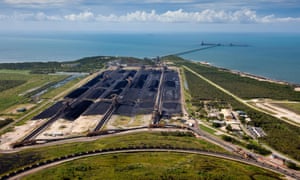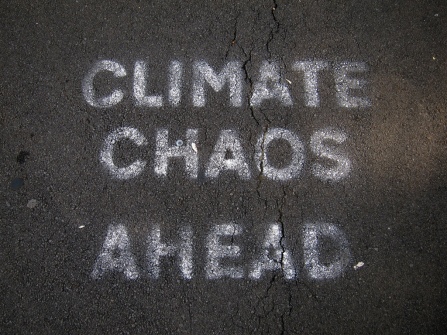A Shell veteran of 35 years requests the company pension fund he depends on to divest from fossil fuels and reinvest in clean energy. A geoscientist currently working for an oil and gas major quits to take qualifications in renewable energy. These are the stories the latest two commenters on my website tell. The great global energy transition will play out in countless small dramas like this. But reminders of the over-arching global narrative, that we are in a race against time, are remorseless. And setbacks in the post-Paris world can be expected in parallel with steps forward, as the last fortnight illustrates all too well.
The oil price has fallen below $30 now: lower than it has been since 2013. The International Energy Agency warns that the oil market may “drown in oversupply” in 2016. The Saudis keep pumping, the warm weather is depressing demand, Iran is re-entering the global market now that nuclear sanctions are over, and so on.
Carbon Tracker has exhorted fossil fuel companies to come clean on climate risks, whatever the oil price, in a short report to the World Economic Forum in Davos. We are far from alone in professing that the post-Paris world requires this. PWC leads the list of those also warning in January of stranded-asset risk in the oil and gas sector. The full disclosures that investors need in order to weight risk of stranded assets and other climate-related downsides should not be long coming. Michael Bloomberg has announced the membership of his elite Climate Risk Disclosure Task Force, which will include Unilever, Axa, Blackrock and JPMorgan. Anyone who reads the last few chapters of The Winning of The Carbon War can have little doubt about the likely tenor of their recommendations, due in March.
All of which should auger well for the progressive diversion of capital from fossil fuels to clean energy that is hard-wired into the Paris Agreement. Standard & Poor’s estimates that $16.5 trillion of new investment in renewables, clean technology and green finance will be triggered by the terms of the treaty. The International Renewable Energy Agency estimates that global GDP will rise roughly 1.1% if renewables account for 36% of the world’s energy mix by 2030, as they should if we are to be on track for the Paris goal of well under 2˚C of global warming.
Progress reports in late January encourage faith in this trajectory. Solar power costs have dropped to a record low of 6 cents per kilowatt hour in Rajasthan, a price that matches electricity from coal and gas. Cost-down in storage is also looking encouraging, with the 3 gigawatts in operation or under development around the world prompting analysts IHS to predict a significant imminent rise in deployment. More than 50 major corporations have pledged 100% renewable energy use, and in Davos they announced they are half way to their collective target.
Meanwhile, however, threats to progress on the Paris agenda pile up. The low oil price has pushed many stock markets into bear market territory – a fall of 20% or more from their most recent peak. This, plus the stuttering global economy, and fears of a Chinese financial meltdown, caused a degree of pessimism in Davos. Some analysts voiced fears of a slide into global recession of the kind seen in 2008.
Fresh from their triumph in Paris, the French government is urging fellow governments to keep the momentum going on climate change, with the next target being signature of the treaty by world leaders in April. “Everything is done, yet nothing is done”, said Laurence Tubiana, France’s chief climate diplomat. She admits to being unsure what impact current fears about the global economy will have.
Some incumbency corporations and many investors barrel on as though nothing has changed. Shell’s takeover of BG has received a green light from investors, with 83% of Shell shareholders voting for the deal. In order to do this, they would have had to to persuade themselves that they can afford to ignore both climate risk and the risk of a prolonged low oil price. Mark Van Baal, who leads a group of 1,000 small shareholders who voted against the deal, said: “There are a lot of better ways to spend €50bn. We are afraid of Shell being the new Kodak.”
The Shell retiree who commented on my website appreciates both points. He was Shell’s first head of renewable energy.
There is bad news everywhere for the oil and gas industry. 42 American shale drillers have now gone bankrupt. Some can’t even give their assets away,
Bloomberg reports. Harold Hamm, a pioneer of shale drilling, told the
FT that companies are simply going to stop producing, so US oil
production must fall steeply this year. People may be surprised by how fast, he says.
Shell and the other majors endlessly repeat their mantra that gas is
much better than coal, in global warming terms. But who can easily
believe this any more? A massive gas leak, cause unknown, was discovered
in a Californian storage well on October 23rd. It is still leaking
unchecked, having become California’s single biggest contributor to
global warming. The Governor has declared a state of emergency over
it. This is an extreme example, but the more scientists scrutinise gas
leakage, right across the gas value-chain from wellhead to consumer
end-use, the more worrying a picture they are finding, as my book
chronicles. There is scant oversight of
storage wells, and until recently very little monitoring of US fracking
either. When the monitoring is finally done properly gas could yet end
up worse than coal in greenhouse terms.And even if it doesn’t, aiming to hit a 1.5˚C global warming ceiling with “highest possible ambition”, as the Paris Agreement requires, means large-scale bypassing of gas en route direct from coal to renewables. Climate scientists are very clear on this.
Consistent with his desire for climate change to be a meaningful legacy of his administration, President Obama is now launched a regulatory crackdown on methane emissions from oil and gas drilling on federal land. Energy industry groups have condemned the “avalanche” of regulations now descending on them, but the President seems to be on a roll with his climate mission. A US appeals court declined to block his carbon-constraint plan from power plants. States led by West Virginia “have not satisfied stringent requirements” to put a judicial stay on regulation, a judge has ruled. And in California, legislators have voted in a raft of measures expanding the solar market.
Clearly the number two greenhouse-gas emitter is making some progress post-Paris. So is the number one emitter. China’s carbon dioxide emissions likely fell 3% in 2015, a trend analysts say looks set to continue. Among other positive developments, the Chinese government has announced that it will allocate $4.6bn to shut 4,300 coal mines over the next three years.
Some countries are pursuing energy policies totally inconsistent with the commitments they made in adopting the Paris Agreement. The UK leads this list. Bloomberg reports that British renewable energy industries are set to “fall off a cliff” as a result of the Conservatives’ active effort to boost support forfracked shale gas and nuclear meanwhile withdrawing support from renewables and energy efficiency. Cuts to wind subsidies will mean the UK will lose at least one gigawatt of renewable energy generation over the next five years. To make the point, RWE has cancelled £1 billion of onshore wind investments, blaming policy setbacks.
David Cameron’s government is showering the energy incumbency with money. He announced a £250 million bailout to prop up the North Sea oil and gas industry, is intent on major giveaways to promote fracking, and has essentially written an open cheque in the multiple billions needed to force the Hinkley Point C reactor through.
Like Shell and its investors, the government seems incapable of reading some very clear writing on walls. A Conservative MP was forced by his constituents to resign from a Parliamentary shale gas group because it is funded by the oil and gas industry. This gives a clear feeling for the opposition shale drillers will encounter in the Tory shires, never mind the leakage rates of methane from their operations.
As for Hinkley Point C, the drama is akin to watching a train wreck in slow motion. EDF, the aspiring operator, was supposed to finalise funding this month at a board meeting. The decision was delayed, amid fears that the company cannot afford the billions required. EDF’s own workforce has begged it not to go ahead, openly voicing fears that this, the most expensive power plant in the world, will bankrupt the company notwithstanding the billions invested by the British and Chinese governments.
Meanwhile, as the UK government flogs the doomed horses of shale and nuclear, and sabotages clean energy in an effort to give investors no choice but to join them, the CBI warns that the threat of a national power crisis is growing.
All the while, the planetary thermostat reminds us of the clock ticking. 2015 shattered the global temperature record by a wide margin, the Met Office reported. The world’s oceans warmed at an increasingly fast rate, the US National Oceanic and Atmospheric Administration warned. Sea level rise from ocean warming has been underestimated, German scientists professed.
The science of climate change has become a matter of legal liability risk for oil and gas companies in recent months. Investigative journalists have uncovered evidence that they lied about the impacts of global warming in public whilst planning to adapt their infrastructure to its effects in private, as I describe in my book. In January, California’s Attorney General launched an investigation into whether Exxon Mobil repeatedly lied to the public and its shareholders about the risk to its business from climate change. At issue is whether such actions could amount to securities fraud. California joins New York, whose Attorney General began investigating Exxon Mobil last November with a view to to possible criminal charges.
Shell is under suspicion too. In 1989, the company redesigned a $3-billion North Sea natural gas platform, fearing sea levels would rise as a result of global warming. In the 1990s, it joined the Global Climate Coalition, an oil, gas and coal lobby group dedicated to defusing concern about climate change and stalling the climate negotiations.
Retirees in oil industry pension funds will be watching closely, no doubt, as their former employers wrestle with climate risk in 2016. Risk of all sorts. Even if Shell’s €50 billion acquisition of BG turns out to make shareholders money in the short term – an increasingly unlikely prospect in the post-Paris world – there is surely risk now that any profit will be wiped out by court fines and brand damage in a world looking back in anger.
Links
- The argument for divesting from fossil fuels is becoming overwhelming | Alan Rusbridger, The Guardian
- Carbon Capture: Has climate change made it harder for people to care about conservation? | Jonathan Franzen, New Yorker
- Is Jonathan Franzen really asking us to shrug off the detruction of our world? | Robert Manne, The Guardian
- Fossil industry faces a perfect political and technological storm | Telegraph.co.uk
- Fossil fuel industry must 'implode' to avoid climate disaster, says top scientist | Guardian



 As China's appetite for resources wanes with the bursting of its
As China's appetite for resources wanes with the bursting of its 

